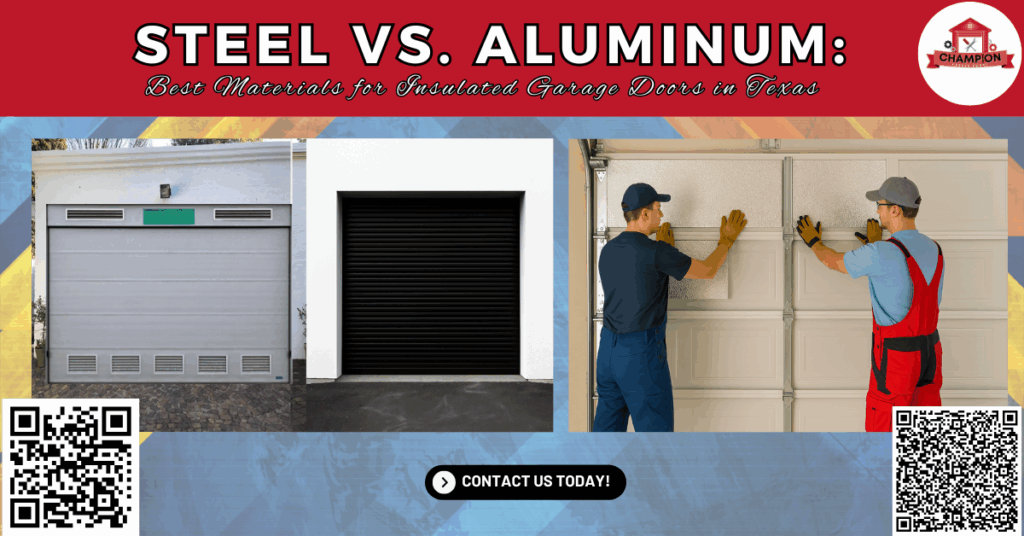When a customer from Bellaire reached out to us after a hailstorm left several dents on their aluminum garage door, it became clear how crucial material choice is for insulated garage doors in Texas. The garage door isn’t just a point of entry, it’s a shield for your garage space, your car, and your home’s energy efficiency. For Texans who deal with extreme heat, occasional freezing winters, high winds, and hail, selecting the right garage door material plays a big role in both comfort and cost savings.
According to the U.S. Department of Energy, garage doors make up nearly 30% of your home’s exterior. If you have an attached garage, the wrong door type can be a source of serious energy loss due to thermal transfer. That translates into higher energy bills, inconsistent indoor temperature, and even long-term damage to stored items in your garage. A well-insulated garage door, made from the right materials, acts as a barrier against heat, cold, and noise.
So, what’s the best material for an insulated garage door in Texas, steel or aluminum? In this detailed guide, we’ll explore the pros, cons, insulation types, R-values, and product options so you can make an energy-efficient, cost-effective, and durable decision for your home or business.
Understanding Insulated Garage Doors
Insulated garage doors are built using multiple layers of materials, such as steel or aluminum, with core insulation made of polyurethane or polystyrene. This structure creates a thermal barrier, reducing heat transfer and helping stabilize garage temperature throughout summer and winter.
Types of Insulation Materials:
- Polyurethane: A high-density foam sprayed between garage door panels. Offers excellent R-value and space-saving benefits. Ideal for energy-efficient homes.
- Polystyrene: A rigid foam panel inserted between door layers. Provides decent insulation and noise reduction at a more affordable price point.
- Fiberglass or Styrofoam: Occasionally used for lightweight insulation, but with lower durability and lower R-values.
Key Benefits of Insulated Garage Doors:
- Reduced Energy Loss: Prevents outside heat or cold from transferring into your home.
- Noise Reduction: Keeps outdoor noises from entering your garage or home.
- Enhanced Durability: Insulated doors are sturdier and resist dents and impacts better.
- Garage Space Comfort: Insulation makes the garage usable year-round.
- Increased Property Value: A new insulated door is a smart investment.
If you’re using your garage as a workspace, gym, or storage area, insulation is essential. Even your garage door opener performs more efficiently when it doesn’t have to fight extreme temperatures.
Steel Garage Doors: Tough, Energy-Efficient, and Reliable
Pros of Steel Garage Doors:
- Exceptional Durability: Steel garage doors resist impact, making them ideal in storm-prone areas or busy households. Double-layer and triple-layer sectional doors with thick insulation add long-term resilience.
- Superior R-Values: Polyurethane-insulated steel garage doors have high R-values (up to R-17+), reducing heat insulation issues and improving energy savings.
- Custom Design Options: Choose from a wide range of panels, textures, colors, and finishes, including those that mimic craftsman garage door styles or woodgrain.
Security and Strength: Reinforced steel panels and frames offer better protection for your home and garage. - Low Maintenance: Galvanized coatings prevent rust, and baked-on finishes reduce repainting needs.
Cons of Steel Garage Doors:
- Heavier Weight: Heavier than aluminum, which means garage door openers need to be strong and reliable. Always pair with a high-quality logic board system in your opener.
- Potential for Rust: In humid or coastal regions, steel is prone to corrosion without proper coating, though modern products often include rust-resistant technology.
Energy Efficiency:
Steel garage doors offer excellent energy efficiency, especially when filled with urethane foam insulation. Their tight seals and thermal barriers make them perfect for managing temperature control in hot Texas summers and colder winters.
Aluminum Garage Doors: Lightweight and Stylish, But Less Insulating
Pros of Aluminum Garage Doors:
- Lightweight Material: Easier to operate and reduces strain on springs and the opener. Perfect for wide single doors or garages where weight is a concern.
- Sleek, Modern Appearance: Offers a stylish, high-end look, especially when combined with glass panels. Works well with modern home architecture.
- Corrosion-Resistant: Unlike steel, aluminum doesn’t rust, making it ideal for humid climates and near-coastal areas.
- Eco-Friendly: Many aluminum garage doors are made with recyclable materials.
Cons of Aluminum Garage Doors:
- Dents easily: Aluminum is a softer metal, which makes it more susceptible to dents from hail, sports equipment, or accidental bumps.
- Lower R-Value: Even when insulated, aluminum garage doors generally don’t achieve the same R-values as steel. They may include polystyrene foam, but it’s usually thinner and offers lower insulation efficiency.
- Initial Cost: High-end aluminum and glass doors can become expensive, especially if you’re customizing with advanced features.
Best Use Cases:
Aluminum garage doors are great for homeowners prioritizing style, weight, and rust-resistance over maximum insulation. They work best for detached garages, mild climates, or minimal-use garages.
Climate Considerations in Texas: Choosing the Right Door
Texas weather can be brutal. From scorching summer heat to freezing winter nights and sudden storms, your garage door insulation must be up to the task.
- Steel Garage Doors shine in energy efficiency and temperature control. With thick insulation and sealed panels, they act as an effective barrier against thermal transfer.
- Aluminum Garage Doors, while modern and lightweight, may struggle with insulation. However, they perform well in coastal cities like Galveston where rust is a concern.
Garage door insulation kits can be an option for existing non-insulated doors, but they won’t match the performance of a factory-insulated door with a rigid foam or polyurethane core.
Cost Comparison and Return on Investment
Steel Insulated Garage Doors:
- Initial Cost: $900 – $3,000+, depending on insulation type, panel style, and brand (Amarr Garage Doors, Clopay, Martin Garage Doors).
- Long-Term Savings: Lower energy bills, reduced maintenance, and increased home value make it a solid investment.
Aluminum Insulated Garage Doors:
- Initial Cost: $1,000 – $3,500+ with glass or high-end panel upgrades.
- Maintenance: Minimal, but may need more frequent repairs due to denting.
Though aluminum may seem cheaper upfront, steel often provides a better return on investment thanks to its energy-efficient design and longer lifespan.
Insulated vs. Non-Insulated Garage Doors: Why It Matters
Choosing between insulated doors and non-insulated doors can mean the difference between comfort and chaos in your garage.
Insulated Garage Doors:
- Maintain a consistent temperature.
- Reduce noise from the street.
- Improve energy efficiency.
- Increase home resale value.
Non-Insulated Garage Doors:
- Expose your garage to weather extremes.
- Higher risk of logic board and opener damage due to temperature fluctuations.
- Offer little to no noise reduction.
For Texas homeowners, insulated garage doors are almost always the smarter option.
How Can Champion Garage Doors Help You?
At Champion Garage Doors, we understand that your garage door is more than just a door—it’s an investment in your home’s energy efficiency, comfort, and security. Whether you need a new insulated garage door, repairs, or upgrades, our experienced technicians in Bellaire, TX, and surrounding areas are ready to help.
We offer:
- Professional installation of steel and aluminum insulated doors
- Garage door opener upgrades with smart features
- Insulation consultations and retrofitting options
- Emergency repairs and replacement panels
- Products from leading brands like Clopay, Amarr, and Martin
We serve residential and commercial customers across Houston, TX, including Bellaire, Vintage Park, and nearby communities.
Visit us at:
Vintage Park Blvd Ste A, Houston, TX 77070, United States
Call now for your free consultation: (281) 609-9466
Champion Garage Doors – Your Local Guide to Insulated Garage Door Solutions.
Frequently Asked Questions (FAQs)
1. Can I add insulation to my existing garage door instead of replacing it?
Yes, you can use a garage door insulation kit with materials like rigid foam or reflective panels, but it won’t perform as well as a factory-insulated door.
2. Does an insulated garage door help with noise inside the house?
Absolutely, insulated doors reduce outside noise, especially useful if your garage is under a living space or near a busy street.
3. How do I know what R-value I need for my garage door?
If your garage is attached or temperature-sensitive, aim for an R-value of 12 or higher for optimal energy efficiency in Texas.
4. Will an insulated garage door affect my garage door opener?
Heavier insulated doors may require a more powerful opener or reinforced hardware, but modern openers like Chamberlain and LiftMaster are built to handle the load.

